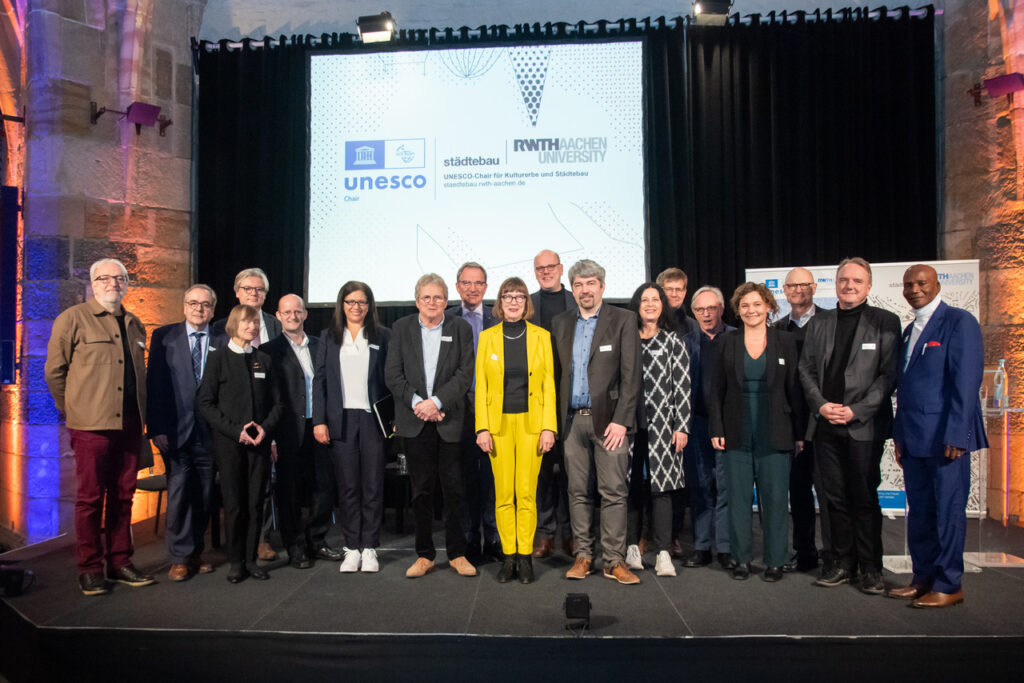Welcome on the site of the UNESCO Chair for Cultural Heritage and Urbanism: UCCU!
Herewith, the UNESCO Chair informs about current activities meeting global challenges of transformation in the theme of Urban Design, Building Culture and Urban Conservation & Preservation.
Regularly updated announcements of upcoming events invite active participation in the Chair’s formats.
For further activities of the Transit Chair in other fields, see Chair of Urban Design and Institute for Urban Design and European Urbanism

Heritage encompasses more than monuments and traditions; it represents humanity’s living memory and a guide for building resilient futures. Under the theme Heritage Futures: Preserving Our Shared Past for a Sustainable World, the UNESCO Symposium highlights the need to reconsider how cultural and natural heritage is protected, used, and transmitted in times of global change. A symposium aimed at researchers and professors as well as master’s and PhD students. Both tangible and intangible heritage shape identities and foster social cohesion, yet they face unprecedented threats from climate change, urbanization, and social transformation. Safeguarding them requires innovation, dialogue, and a balance between local needs and global responsibilities. Heritage is also a driver of sustainability. In connection with the United Nations Sustainable Development Goals, it supports climate adaptation, energy efficiency, and environmental stewardship. Traditional practices and cultural landscapes provide ecological knowledge essential for modern societies, demonstrating how preservation contributes directly to sustainability. Urban heritage also represents a critical dimension. Rapid urban growth often endangers historic centers and cultural practices. To ensure their continuity, cities must integrate heritage into resilience strategies so that past and present coexist productively, and historic environments remain inclusive and livable. Looking ahead, Heritage Futures raises key questions: How can heritage remain vital in a globalized and rapidly transforming world? In what ways can preservation advance sustainability and respond to climate change? How can urban resilience and heritage conservation be aligned to keep historic cities adaptable and inclusive? These questions frame an urgent debate: preserving our shared past is not only about memory, but also about shaping pathways toward a sustainable future.
On 14 October 2025, the European Heritage Hub Forum took place at the Brussels Town Hall under the theme “Heritage Matters for Europe’s Cities and Citizens.” The forum brought together policymakers, institutions, and civil society to discuss resilient heritage governance, sustainable tourism, and future funding frameworks within the European Heritage Hub initiative.
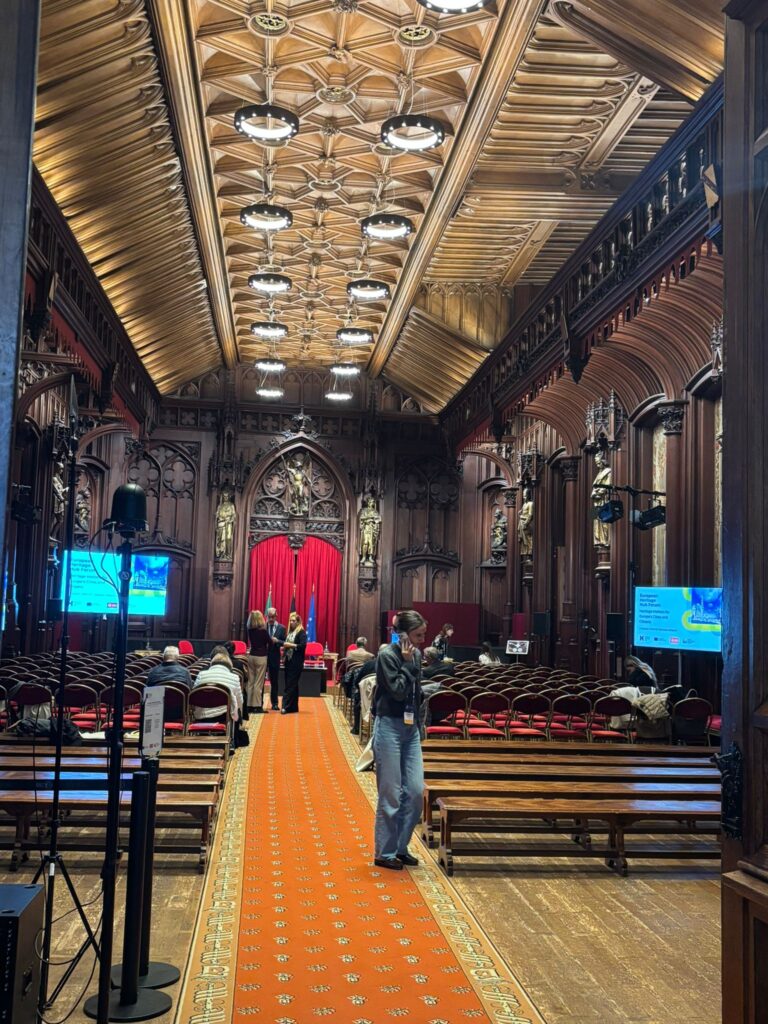
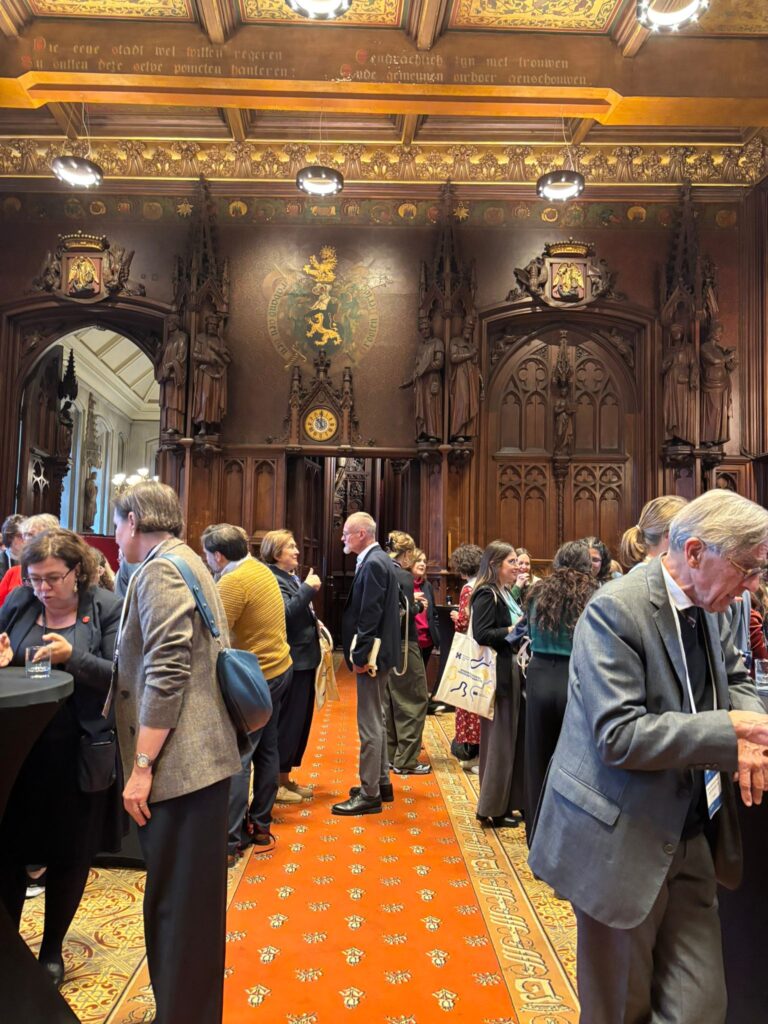
The article tells us about Erik Vorwerk’s scientific presentation. Based on his Master’s thesis in Architecture at RWTH Aachen University, he gave a talk on the topic of ‘Resilient urban development in a historical context’, using Stolberg as an example. Through the concept of the ‘sponge city Stolberg’, Vorwerk presented interesting possibilities for the future development of the city centre, as well as the old and new towns.
Read the full article here: https://www.aachener-zeitung.de/lokales/region-aachen/stolberg/kulturerbe-zukunftsfaehig-erhalten/97900488.html
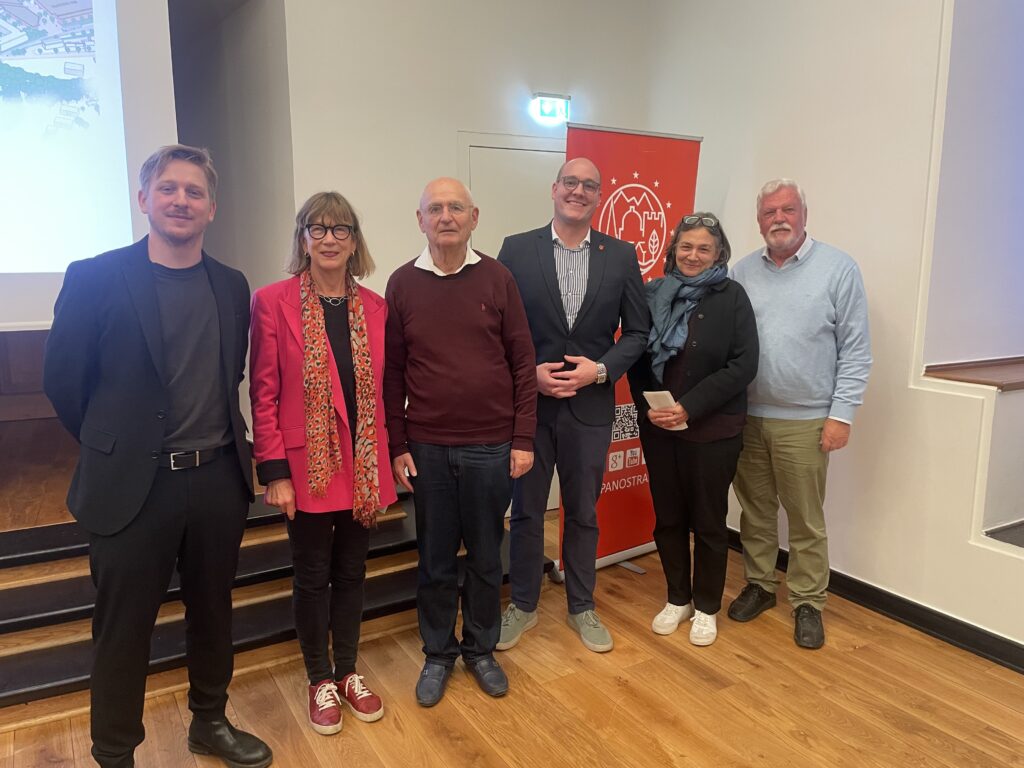
The Annual Conference of the Network of German UNESCO Chairs took place on 1–2 October 2025 at RheinMain University in Wiesbaden under the motto “Innovation for a Sustainable Future – Impact of German UNESCO Chairs on the SDGs.”
The conference brought together representatives from UNESCO Chairs across Germany to exchange ideas, showcase innovative research and educational initiatives, and discuss the contribution of higher education to achieving the United Nations Sustainable Development Goals (SDGs).
Through keynote lectures, interactive workshops, and panel discussions, participants explored how academic collaboration, digital transformation, and interdisciplinary approaches can drive sustainable innovation in education, science, and culture. The event provided a platform for sharing best practices and strengthening cooperation among institutions committed to UNESCO’s values of peace, sustainability, and international understanding.
By highlighting the tangible impact of German UNESCO Chairs on local and global challenges, the conference reaffirmed the network’s commitment to fostering knowledge-driven solutions for a more just and sustainable future.
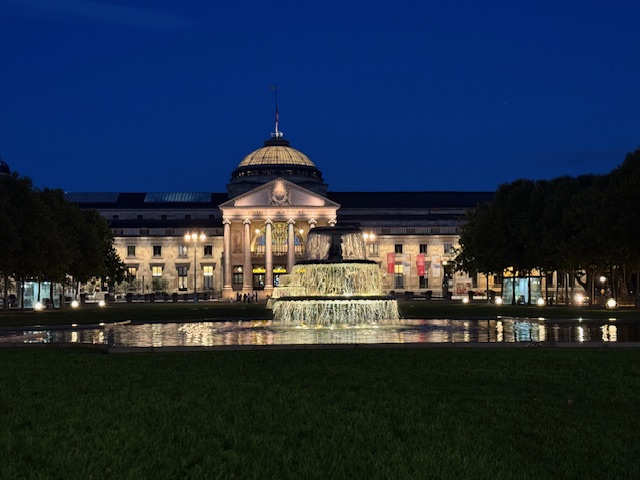
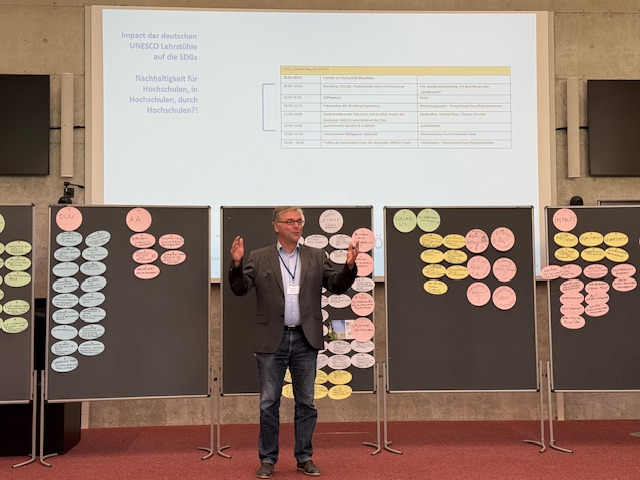
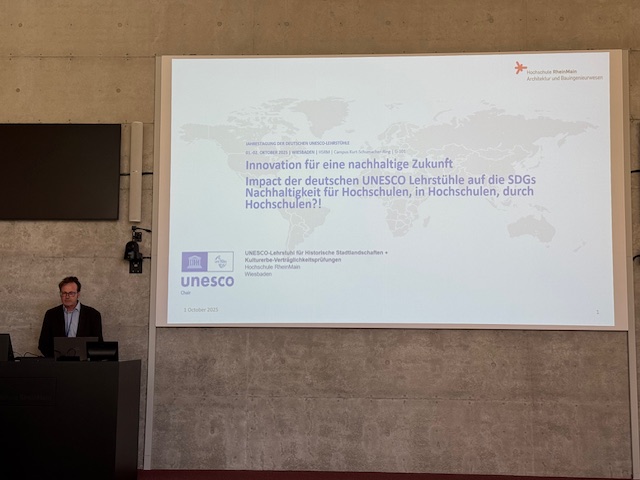
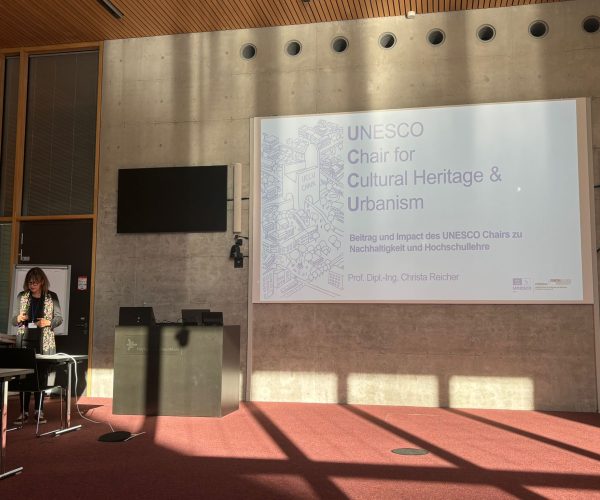
From 24–30 March 2025, the Master Transforming City Regions programme embarked on a field trip to the UNESCO World Heritage cities of Úbeda and Baeza in Andalusia, Spain. Led by Prof. Dipl.-Ing. Christa Reicher and Dr. Javier Ostos Prieto, the trip explored how these Renaissance cities balance heritage preservation with modern urban needs. Students conducted morphological analyses, studied urban and heritage characteristics, and developed proposals for sustainable protection and revitalisation of historic areas.
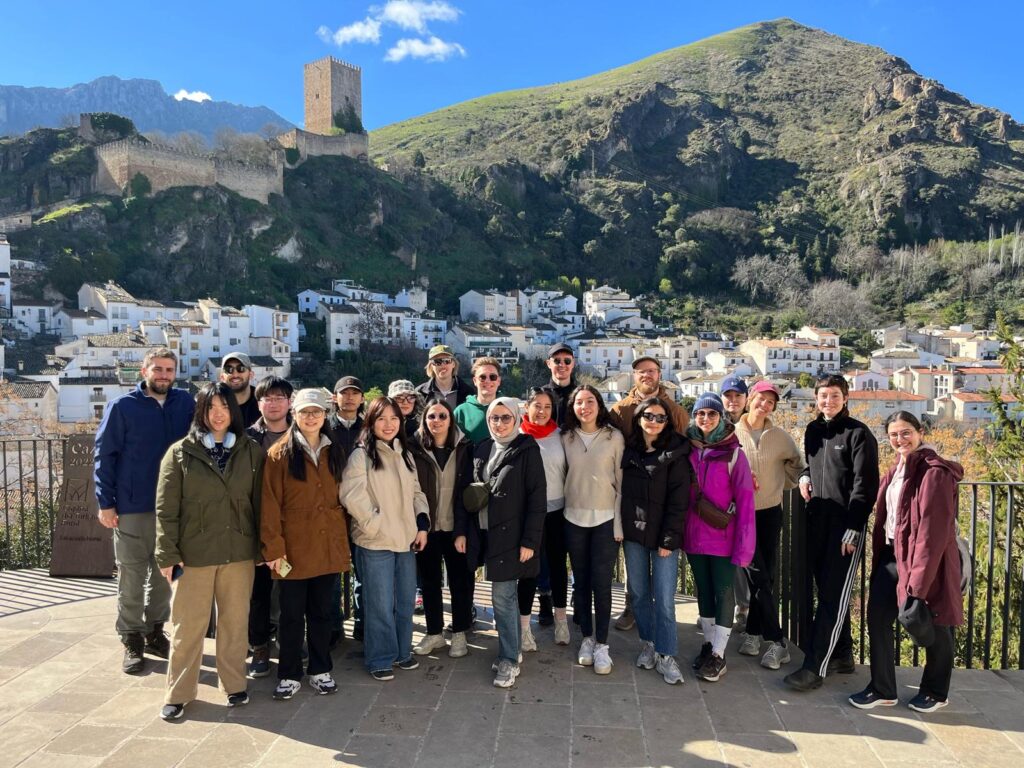
The UNESCO Chair for Building a Sustainable Living Environment has been featured in the Franken Magazin (July/August 2025 edition) and ARTMAPP (Summer 2025 edition) for its collaboration with the city of Rothenburg ob der Tauber.
We are honored to see our academic and institutional efforts recognized on such platforms, reinforcing the relevance of UNESCO’s mission at both local and regional scales.
UNESCO’s role and impact on the preservation of the historic city is decisive. Buffer zones are conceived as areas designed to preserve the heritage values of the building. World Heritage Sites maintain a balance between preserving their historic areas and meeting the demands of modern urbanism. In this course we will work on the preservation of the historic city in Andalusia, Spain, through UNESCO cities. These represent paradigmatic examples of urban management carried out due to their World Heritage status.
Heritage is a fundamental part of urban development. Within the Master Transforming City Regions and the UNESCO Chair for Cultural Heritage and Urbanism we have planned the field trip: ‘Unveiling Andalusian Urban Heritage’. On this trip, students will work in two Andalusian cities: Úbeda and Baeza. These cities, recognised as UNESCO World Heritage Sites, maintain a balance between preserving their historic areas and meeting the demands of modern urbanism. Their status as UNESCO cities gives them worldwide recognition, which increases the responsibility to maintain their architectural and urban integrity.
Our Chair has participated at the International UNESCO Chairs Conference from October 7 to 9, 2024, at the Leuphana University in Lüneburg. At the conference we were able to discuss current and future issues affecting the Sustainable Development Goals (SDGs). Furthermore, we were able to share and exchange ideas and discussions between the different UNESCO Chairs from Germany as well as from all over the world. The conference has laid the foundation for international cooperation and the reflection of the role of UNESCO Chairs on the international level.
The opening of the conference was a discussion with the question ‘Is the glass half full or half empty?’ where the UNESCO Charis asked whether the SDGs were really being achieved and to what extent it was possible to reach those targets. This was followed by different concurrent sessins where the research and teaching objectives of each UNESCO Chair were presented. Prof. Dipl.-Ing. Christa Reicher presented the complex framework of our Chair’s activities, highlighting a large international cooperation with countries not only in Europe, but also in the Middle East, Africa and the Americas. In addition, our role at the RWTH Aachen and our work in teaching at Bachelor, Master and PhD level were presented. The conference was highlighted by a visit to the natural world heritage of the ‘Niedersächsische Elbtalaue’, where all attendees could share the heritage values of the area. Finally, the conference paid special attention to the role of young researchers, especially the international Young academics who have an essential role in the future of UNESCO and our universities.
The first cultural heritage monument to be protected as a UNESCO World Heritage Site is the Dom in the city of Aachen. In addition to the building itself, there is a buffer zone that includes the entire historic city centre, which makes Aachen a World Heritage area. The aim of UNESCO Walks is to tell the history of Aachen from a historical, urban planning and cultural-historical perspective. The different layers of Aachen show us an infinite number of events that have shaped and built the city of today. In addition, the various points of the tour are linked to SDG Goal 11. In this way, we immerse ourselves in Aachen’s past, which will undoubtedly contribute to sustainable urban development. Explore the Full UNESCO Walks Brochure!
The article from the Rheinische Post features an interview with Prof. Christa Reicher, the holder of our UNESCO Chair for Cultural Heritage and Urbanism at RWTH Aachen. She explains why Aachen was chosen for this UNESCO Chair, highlighting the chair’s focus on international cooperation and knowledge transfer in urban planning and cultural heritage. Prof. Reicher discusses the integration of a global sustainability agenda into education, emphasizing resource management and resilience in city planning. She points out successful urban development examples in Germany, including Düsseldorf’s Raumwerk D and Aachen’s historic potential. Reicher also stresses the importance of combining past and future to create unique, sustainable urban spaces.
Read the full article here.
On March 21-22, 2024, RWTH Aachen University hosted an international conference organized by the CITIES.BUILDING.CULTURE Consortium. Alongside the Chair and Institute for Urban Design and European Urbanism at RWTH Aachen, the Consortium reunited researchers from the Karlsruhe Institute of Technology and the Leibniz Institute for European History and Culture (GWZO) in Leipzig. The event was the result of the collaborative three-year project supported by the German Ministry of Education and Research (BMBF), attempting to develop new approaches to the sustainable management of everyday built heritage in the post-Soviet space.
Bringing together over 80 participants including established researchers, practitioners, as well as master and doctoral students from various universities across Germany, the Netherlands, Ukraine, Italy, Austria, Hungary, Czechia, and beyond, the event transcended a mere presentation of project outcomes. Accompanied by an exhibition displayed in the Foyer of the Reiff Museum, the conference embraced interactive formats, opening a space for discussion and debate.
A notable highlight was a roundtable chaired by Prof. Florian Urban from the Glasgow School of Art, where participants, both researchers and practitioners, discussed the challenging future of large housing estates. Furthermore, a marketplace-style arrangement facilitated engaging discussions on an array of topics, ranging from methodologies in studying residential heritage to exploring the limits of heritage concepts and practices, to practical considerations regarding the renovation of such heritage. Keynote addresses were delivered by Prof. Dr. Philipp Meuser from DOM publishers, and Dr. Semen Shyrochyn from Ukraine. Overall, the conference provided new insights and perspectives on the topic of residential heritage, while connecting research from Eastern Europe to broader international agendas.
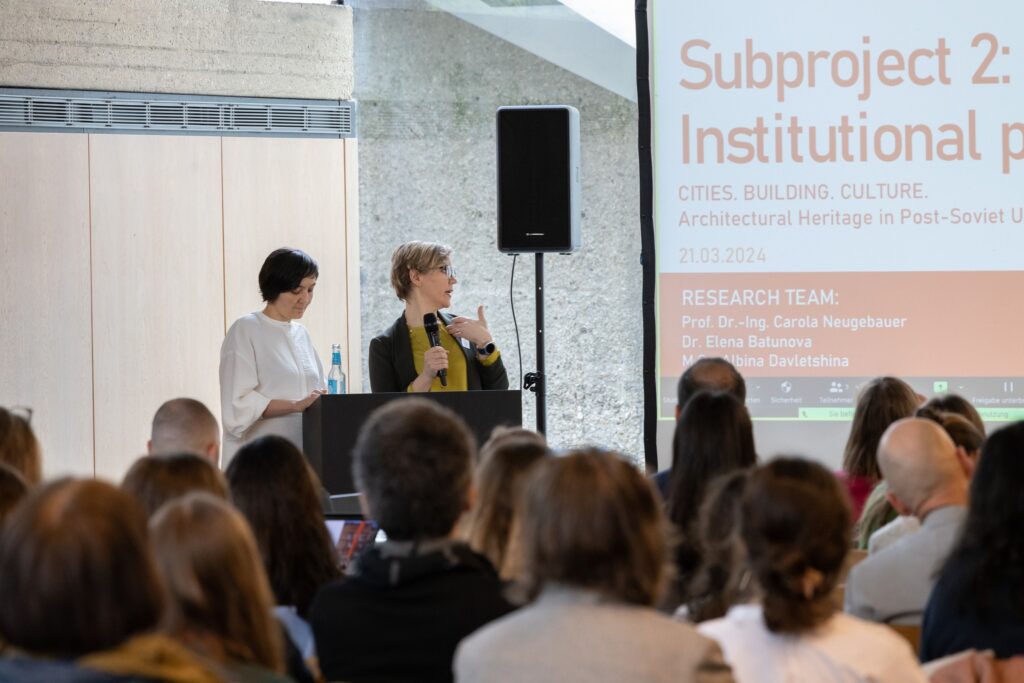
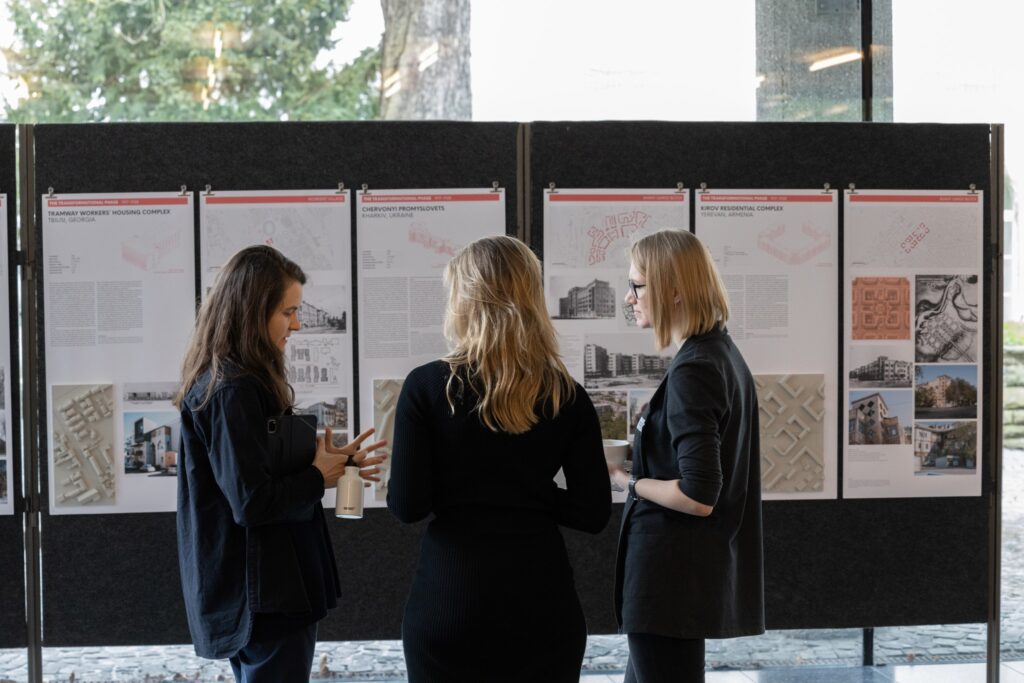
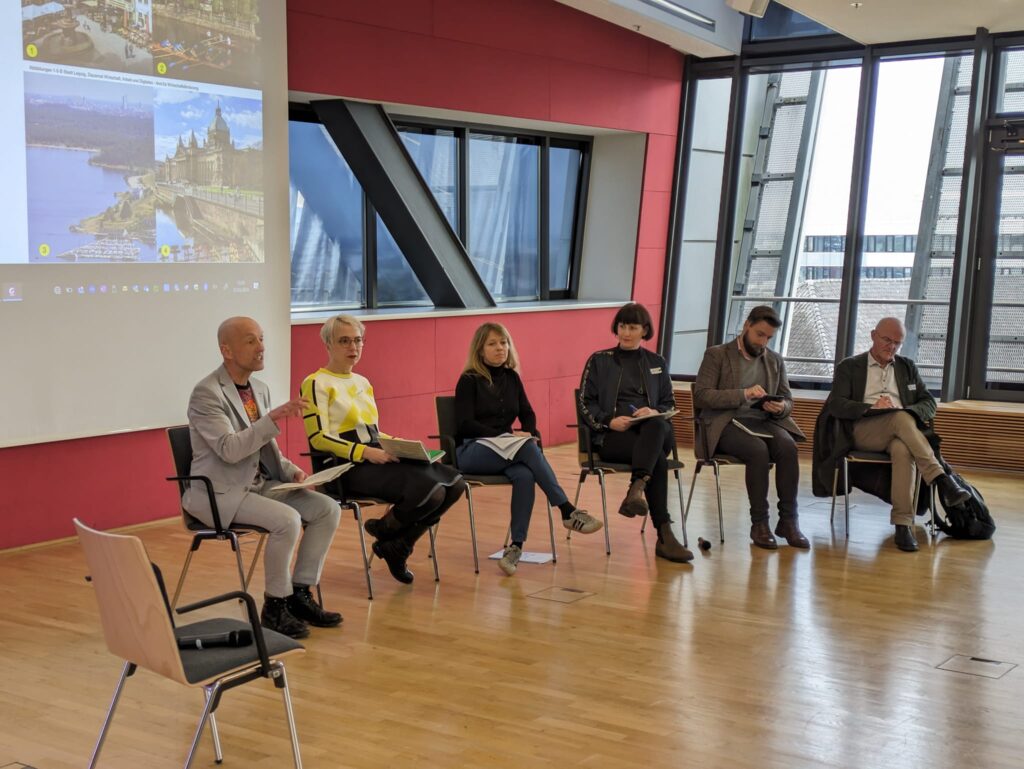
Under the title “Learning from Ahrtal – Climate, Resilience and Heritage”, the Emerging Profession-Working Group of ICOMOS Germany is organizing its second Spring School together with the UNESCO Chair for Cultural Heritage and Urbanism and the Chair for Architecture History at the RWTH Aachen University. The Spring School will therefore take place from March 22 to 24, 2024 in Aachen and Ahrtal.
In 2021, the Ahrtal suffered severe flooding, which had a major impact on the lives of its inhabitants, the region and its cultural heritage and left them wounded. Climate science is increasingly pointing to the fact that the frequency and intensity of such storms will increase in the future. The flood also showed how vulnerable the built heritage is and how urgently the questions surrounding strengthening its resilience should be addressed and answered. It is important to address the negative consequences of climate change now in order to take timely measures for adaptation and prevention.
Using the example of the process and handling of the Nepomuk Bridge in Rech, the topic will be addressed in a three-day workshop. The aim is to give the next generation an insight into how complex and multi-layered the discourse surrounding the preservation of our heritage can be through discussion, on-site experiences in the Ahr Valley and presentations by experts. The workshop aims to raise awareness of the importance of heritage conservation and the challenges associated with the preservation of historic sites and structures due to the negative consequences of climate change. The aim is to identify and communicate best practices and strategies for the preservation of cultural heritage and to develop solutions for a future worth living.
Applications to participate will be considered until 15th February. Follow the link for more information and application criteria:
The Host-Chair of the UNESCO Chair for Cultural Heritage and Urbanism offers, since years, the opportunity to students to combine the teaching/learning of concept-finding with a participation in external Students’ competitions.
This promoting of young talents is based on the themes of careful urban renewal and urban monument preservation. In the year 2023, the UNESCO Chair for Cultural Heritage and Urbanism is pleased about the successful application of students‘ contributions to the ICOMOS Students‘ Competition “1960+: Pleas for the preservation of post-modern buildings“, for which the Aachen students have intensively discussed the values and phenomena of postmodern architecture and urban planning within their regional, national and European context. The contributions have been supervised by the UNESCI Chair, consisting of design based evaluations of selected buildings and of analytic-conceptional ideas. The UNSCO Chair for Cultural Heritage and Urbanism is particularly pleased in alignment with the success of Ahmet-Turan Toglukdemir, who was awarded with a first place!! Further information about the offers of a reward will be provided here.
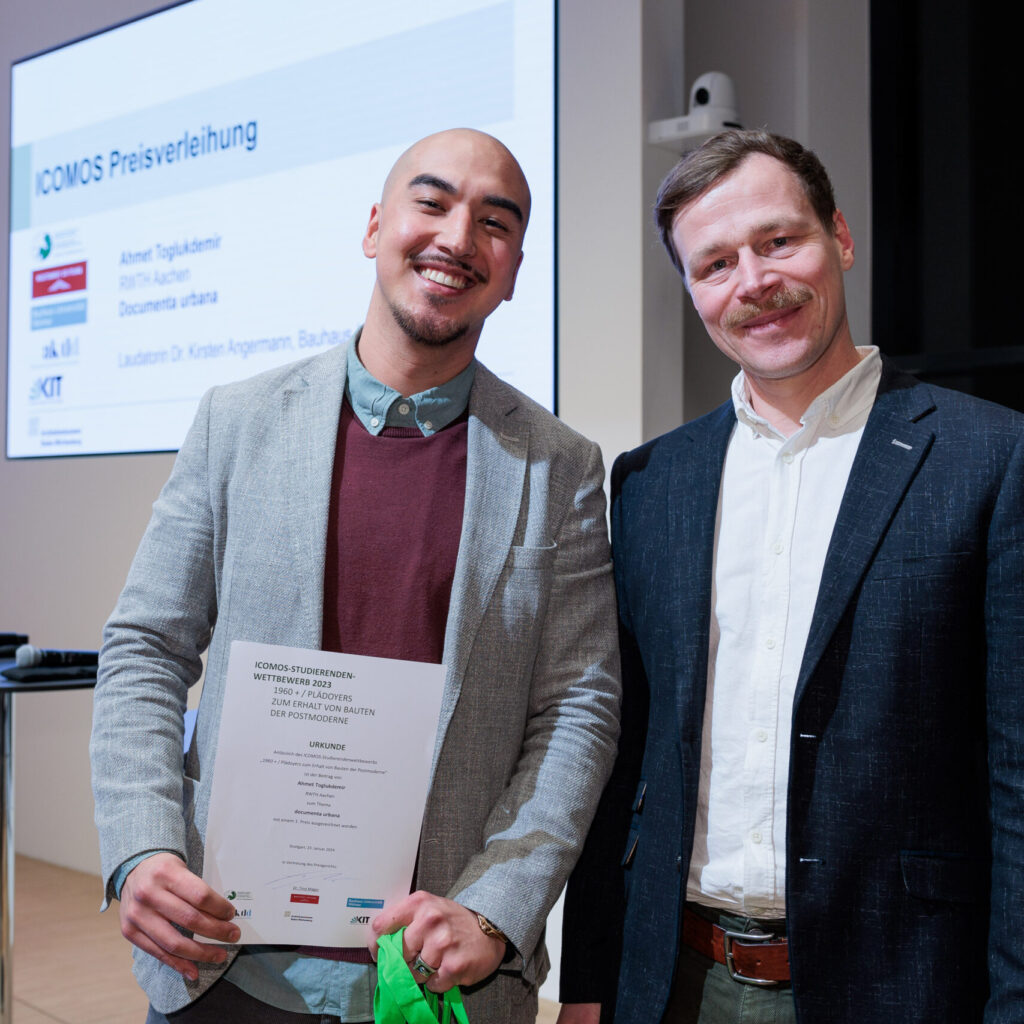
The UNESCO Chair for Cultural Heritage and Urbanism is involved as a member of the three-years‘ research alliance Sustainability for Architectural Heritage (SAH), in cooperation with partners of UnivAq (University of Aquila, Italy), NTU (National Technical University of Athens, Greece), NUACA (The National University of Architecture and Construction, Armenia), GSU (The Goris State University, Armenia), UT (The University of Tehran, Iran) and TIAU (Tabriz Islamic Art University, Iran) for a curricular comparison within the field of Architectural and Cultural Heritage. The project, funded by ERASMUS+, has found its conclusion in a final conference at NUACA (National University of Architecture and Construction) in Yerevan. The formal end was characterized by the presentations of results for proposals of curricular qualification. Furthermore, the identification of additional synergies for a perspective stabilization of collaboration in a network had been planned. The conference was accompanied by an exhibition of students’ works, which had been generated as part of the ongoing cooperation. More information about the SAH-network will be provided here.
The UNESCO-Chair for Cultural Heritage and Urbanism has organized an evening discussion about the entanglement of the themes „Resilience and Cultural Heritage“. The event is part of a sequence of round table talks, having taken place during the 18th. Architectural Biennale in Venice and contributing to the exhibition „Climate Wunderkammer“, which was co-curated by Prof. Christa Reicher. The evening had concentrated its focus on different approaches of an integrated risk management for the cultural heritage on the European and on the national levels. Therefore, experts of the Federal Ministry of Housing, Urban Development and Construction of Germany, of the Technical University of Delft, of the University of Liege and additional actors have met. More information about “Climate Wunderkammer” will be provided on the website.
The 13th annual conference of the experts of „Urban monument preservation“ took place with the title „ Identity and Common Welfare – Building Stock as Resource for Culture and Education “, on 26.10.2023 at the Technical University of Cologne.
The event offered a comprehensive insight into current trends and challenges in the field of urban monument preservation.
The group of experts, having been founded by Prof. Christa Reicher, Head of the UNESCO Chair for Cultural Heritage and Urbanism, 13 years ago, unifies experts from research and practice, inviting for a public discussion of questions about urban monument preservation on the scale of urbanism once per year. Further information about the group of experts, their activities, their publications and coming events will be provided here.
In cooperation with representatives of international universities like the German Jordan University (GJU, Amman/ Jordan) and the German University of Technology in Oman (GUtech (Maskat, Oman) as well as the collaboration with German institutions and urbanists, the UNESCO Chair for Cultural Heritage and Urbanism organizes the „UNESCO Symposion International“.
The main goal of this symposion was, to enfold an updated overview about the perspectives of interventions into urban transformation through practice and equally by developing knowledge in academia and their effects on urban transformation and needed transformation processes within the context of cultural heritage.
Basic concepts, leading to a better understanding but also intervening into the design of cross-section- dimensions, were aimed to be identified, in order to allow for a better integration of the aspects of cultural heritage into planning processes for cities and regions. Further more, a common idea was generated about how to set up and conceptualize a durable curriculum in this field within the international network. More information about the event will be provided here.
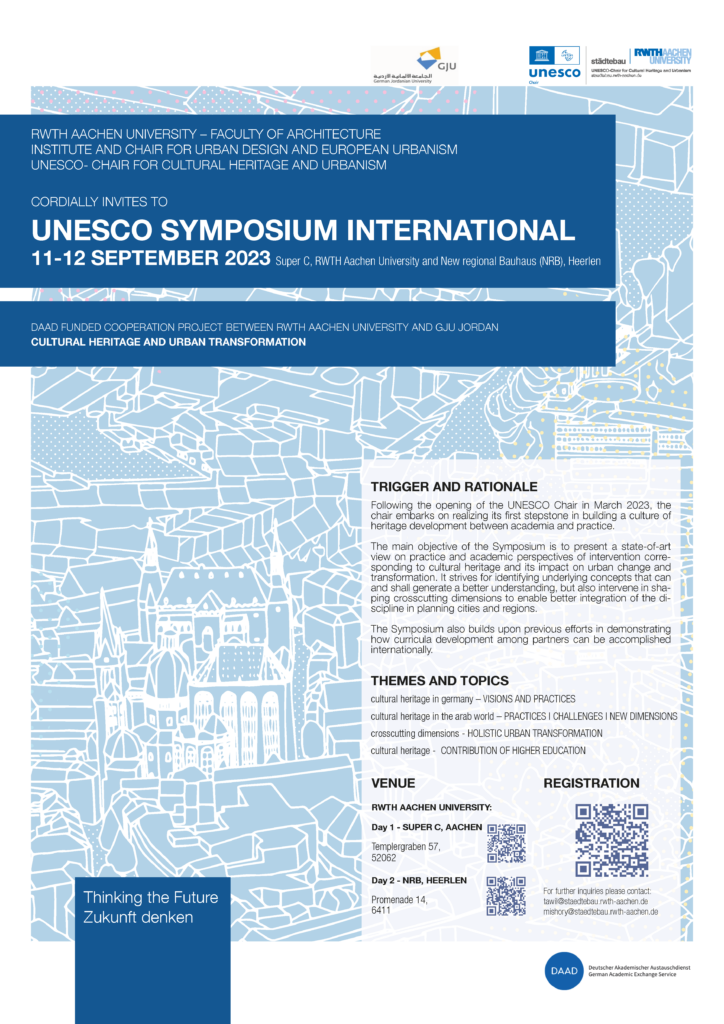
By the title “Neighborhood Heritage: Urban layers, physical environments and living communities in the post-socialist/-Soviet city, the UNESCO Chair for Cultural Heritage and Urbanism has organized a doctoral school in Tiflis as part of the research project “cities.building.culture (cbc)” – in cooperation with the ILIA State University (Tiflis, Georgia), the Karlsruhe Institute of Technology (KIT, Karlsruhe) and the Leibniz-Institute for History and Culture of Estern Europe e.V. (GWZO, Leipzig). 16 students with different academic and cultural origins had been invited to investigate differentiated approaches to analyzing urban quarters and their multi-layered heritage: Urban morphology, construction and the perception of values, civic commitment and municipal administration, local memory and belonging to local conditions, meaning and effects of processes like re-vitalization, renovation, gentrification and downgrading, mechanisms of conservation, but also loss and demolition of heritage were considered as foci of the research interest.
The phd candidates have investigated different urban areas by means of visual research methods in inter-disciplinary groups and have presented the results at the end of the week towards the cbc-team. They were accompanied by international professional lectures and discussion rounds with local experts. More information, also about the research project, will be provided here.
The Aachen UNESCO Chair for Cultural Heritage and Urbanism has initiated to give life to the „New Regional Bauhaus“ (NRB) in inner urban areas of the Dutch neighbouring town of Heerlen. Directly located within the three countries corner (DE, BE, NL) the NRB focusses on a local common thinking and a regionally adapted approach to global challenges by activities in research, education and public events. The institution is supposed to emphasize on the relevance of the regional scale in the areas of sustainability, integration and quality of design. Actors from the region are cordially invited to approach to common themes at this place. Further information as well as options for booking will be provided here.
On March 31, we celebrated the opening of the UNESCO Chair with more than 200 invited guests in the Coronation Hall of Aachen City Hall.
Aachen’s Mayor Sibylle Keupen, the Rector of RWTH Aachen University Prof. Dr. Ulrich Rüdiger, the Secretary General of the German UNESCO Commission Dr. Roman Luckscheiter and Prof. Dr. Alexander Markschies, Vice Dean of the Faculty of Architecture, emphasized the importance of the new UNESCO Chair for RWTH Aachen University, the city, the region and its role in the national and international context in their welcoming speeches.
The UNESCO Chair is part of the UNITWIN/UNESCO Chair Program. The Chair’s task is to shape the transformation of cities and neighborhoods in a sustainable way, with a particular focus on cultural heritage. In research and teaching – in particular with the Master’s degree program “Transforming City Regions” – the Chair aims to dedicate itself to interdisciplinary education and international transformative research. In close cooperation with the German UNESCO Commission, the UNESCO World Heritage Committee, the UNESCO World Heritage Centre and the organizations ICOMOS, ICCROM and IICN, the discourse on the future of historic urban landscapes will be conducted.
The event was dedicated to Prof. Dr. Michael Jansen, who was committed to cultural heritage for many decades and who passed away unexpectedly in July 2022.
